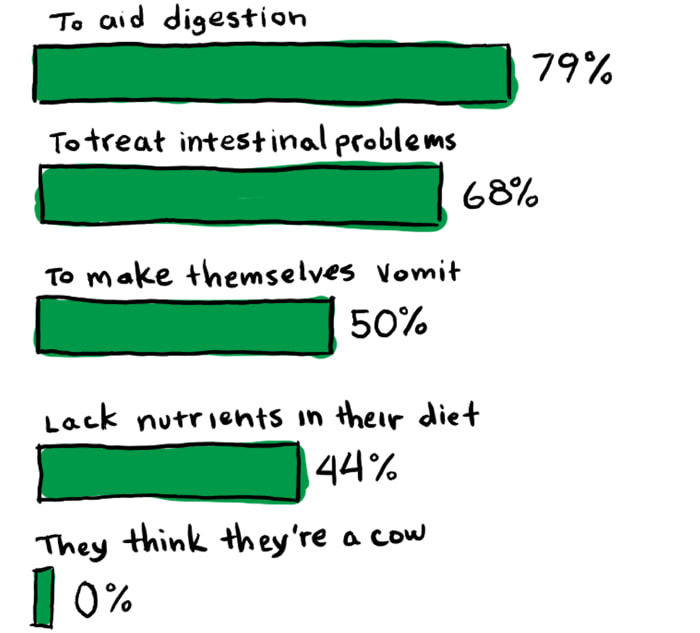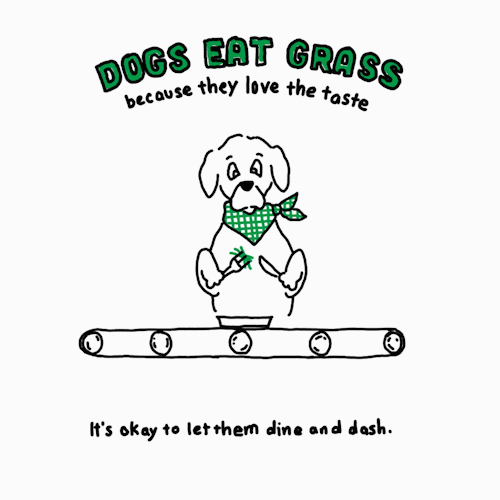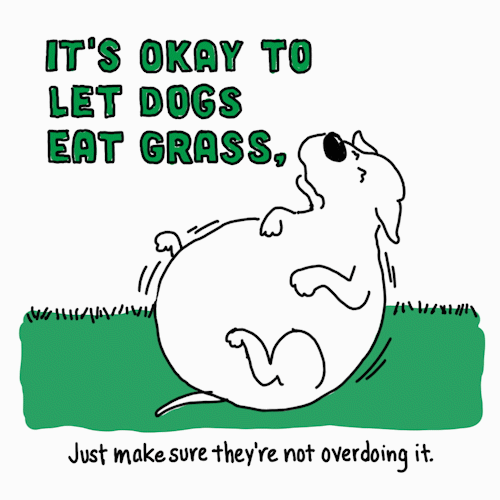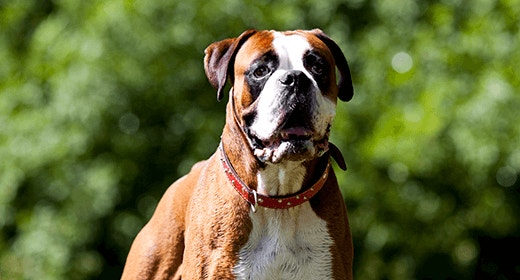

In a recent IAMS poll of dog owners,* 69% said their dog eats grass. That’s quite a lot. Owners also have quite a lot of theories on why their dog is noshing on the lawn.

It’s not just modern-day canines that eat grass. It’s likely something that has been going on for thousands of dog years. According to
Opens a new windowDr. Tammie King, Applied Behavior Technical Leader at Waltham Petcare Science Institute, “It is actually normal canine behavior. It has to do with innate behavior from canine ancestors. Potentially a remnant behavior.”
Dr. King also shared this with us: “A lot of people think dogs eat grass when they’re feeling ill, but studies have shown that’s not necessarily true.”
But then why do dogs eat grass? To get to the (grass)root of this issue, we asked
Opens a new windowDr. Jo Gale, BVetMed CertLAS MRCVS Senior Manager of Global Science Advocacy at Waltham Petcare Science Institute.
'There's no one reason. They just like the taste, texture and feel of the grass.'
So it’s perfectly fine if your pooch decides to have an occasional grass snack. Who doesn’t crave a salad every now and then?
However …

If your dog is getting adequate nutrition, there’s no need to worry. But the experts we talked with asked dog owners to please keep in mind the following:
· Grass that’s been treated with weed killer or pesticides should be off the menu.
· If your dog is eating grass excessively or routinely vomiting from eating grass, consult your vet.

Looking for the perfect dog food to pair with their side of sod slaw? IAMS has the answer for that, too.
*Surveyed U.S. dog owners, age 18+
Sample Size: n=201
Fielded May 8 to May 10, 2020


Fiber is important to your dog's health, providing bulk to move food through his intestinal tract. Some types of fiber can be fermented (broken down by bacteria) in the intestinal tract. This process creates short-chain fatty acids (SCFA), which are a key energy source for the cells lining the intestinal tract.
Most people are aware of fiber and its role in their diet. The beneficial effects of higher fiber levels in humans influence the way many people think about their own food—and their pets’ food. As a result, some pet-food manufacturers began to think like human nutritionists and make high-fiber diets for dogs. But high-fiber diets and the shorter digestive tracts of dogs don't always mix well. High fiber levels in dogs can cause digestive problems and interfere with proper nutrient absorption. Unlike humans, dogs are carnivorous, meaning their nutritional needs are better satisfied with meat rather than with plant materials.
For more than 60 years, pet nutritionists at IAMS™ have been studying diets to better meet the special nutritional needs of dogs. IAMS research shows that the optimal crude-fiber level for healthy dogs ranges from 1.4 to 3.5%. At these levels, nutrient digestibility is maximized.
An important characteristic of fiber is its fermentability, or how well it can be broken down by the bacteria that normally reside in the dog's intestine. This breakdown of dietary fiber produces SCFAs that provide energy to the cells lining the intestines. Different types of fiber vary in fermentability.
Fiber sources used in pet foods include cellulose, which is poorly fermentable; beet pulp, which is moderately fermentable; and gums and pectin, which can be highly fermentable.
Research has shown that moderate levels of moderately fermentable fiber, such as beet pulp, provide the benefits of energy for the intestinal lining and bulk without the negative effects of excessive stool or gas.
High levels of poorly fermentable fiber are used in some weight-reduction pet foods to dilute the calories in a serving. IAMS research found that this is not a good practice because high fiber levels can decrease the digestibility of other nutrients in the food and, therefore, can reduce the nutritional quality of the diet. You might also see more poop piles in the yard because of the indigestible fiber.
The key thing to remember about dietary fiber is that your dog's needs are not the same as yours. A moderate level of moderately fermentable fiber, such as beet pulp, provides proven nutritional benefits for dogs. Diets containing high levels of poorly fermentable fiber to dilute calorie content do not provide these nutritional benefits.
All IAMS products, including IAMS™ ProActive Health™ Adult MiniChunks, are formulated with optimal levels of moderately fermentable fiber to promote a healthy intestinal tract and enhance the well-being of your dog.